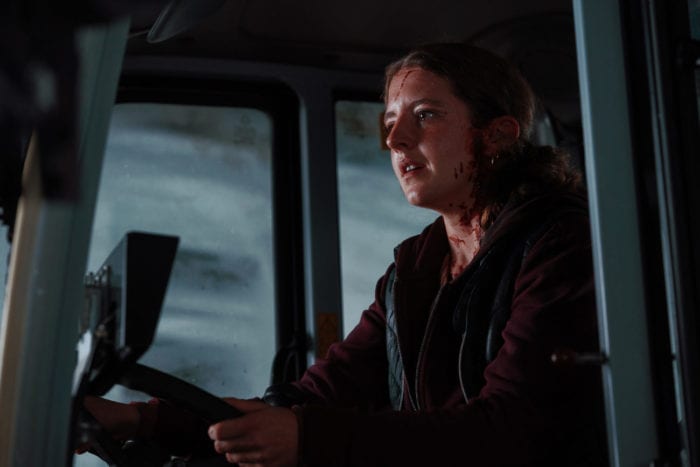Have we had our fill of vampire films yet? I thought I had, but two factors about Boys from County Hell intrigued me: the UK premiere at Mayhem Film Festival sold out last October, and it was directed by Chris Baugh, whose tense Bad Day for the Cut had me gripped from beginning to end. So, I pressed “play” expecting something original, and it was.
Boys from County Hell is set in Six Mile Hill, a small town in rural Derry, Northern Ireland. There’s nothing much there except for a pub and a pile of rocks in a nearby field, said to be a cairn marking the grave of Abhartach. This was not only the name of the earliest recorded bloodsucker but also—reputedly—one of the influences behind Bram Stoker’s Dracula. Some of the local residents cater to the tourists coming to see this mythical landmark, some prefer to prank them, and some just want to get away somewhere and a find more meaningful existence. In the midst of this conflict, usually managed (or ignored) fairly smoothly, testosterone is mixed with beer one night, a fight leads to blood spilled on the stones of the cairn, and the boys soon discover the horror behind the legends.
Bloody sinister, right? Despite everything I’ve already outlined, Boys from County Hell is actually a comedy just as much as a horror but one full of nervous laughter and situational humour, rather than riotous. As horror-comedy goes, the tone is more Prevenge than Extra Ordinary, though I accept watching it in a festival crowd (oh how I miss those) could have given the film a radically different atmosphere. The humour is decidedly dry, black, sweary, and thoroughly Irish; it is mostly situational, with plenty of insults and disbelief thrown in about what the town is going through.
As the film’s title suggests, Boys from County Hell is about the people (mostly blokes) rather than what lies buried in their back yard. At the centre of the story are three young men: Eugene (Jack Rowan), SP (Michael Hough), and William (Fra Fee), all close friends until one wants to emigrate, one finds himself working for his father’s hated roads and construction firm, and the other remains in front of the television with a beer in his hand. Eugene suffers from torn loyalties (just as Jack Rowan’s character in Noughts and Crosses did, but with less melodramatic angst), and the clashes with his father seem to sum up what the whole town is going through: should he/it progress and improve, or stay in a traditional rut? This is a dilemma about responsibility and being true to oneself, but Eugene and his family really are a microcosm of tourist Ireland in this sense. That said, I’ve seen a similar conflict in Bait, another film about tradition versus tourists, set in Cornwall.

No doubt, you’re reading this because of the horror aspect, and yes there really is some here. Boys from County Hell may be a sarcastic domestic drama, but it’s got plenty of supernatural effects and gore too. The opening scene shows us to expect blood (almost with a Shaun of the Dead style “you’ve got red on you” tone), and it does indeed gush when the story is ready, with above-average visual effects too. The big bad isn’t dwelt on much (he’s a catalyst, and a black cloud hanging over the town, rather than the subject, after all), but when he does appear, after much anticipation, he is gruesome. Abhartach isn’t strictly a vampire, as he comes from a time before such things became a known legend, and therefore defies most cinema and literary tropes.
Despite having spent my formative years in Ireland, I’d not heard of Abhartach until now, but I was fascinated to discover that this was no monster made up for a film but a real legendary villain who came back to carry on after death. The name of the town and the type of monument have been changed, but word has it workers trying to clear the land ran into trouble not too long ago. So Boys of County Hell could have been one of those films with “based on a true story” at the start, but thankfully, it wasn’t that crass.
Chris Baugh co-wrote the film with Brendan Mullin, also his collaborator on Bad Day for the Cut, and the result is a film which will not fit comfortably into any single horror subgenre. It is a pessimistic comedy, it is folk horror without any paganism, it is a vampire story without glamour. Yet it works with a “screw you” type of confidence: there is nothing here that’s lazy nor that tries too hard.

I do have some minor issues with the film, mind you. Firstly, I know it was about the Boys, but it was still a pity to see the female characters sidelined as they were. There was in fact one female member of the little gang, Claire (Louisa Harland), but her personality was not much different to a blend of the three lads, and the fact that she drove a bulldozer and swore just like the others makes me wonder if her role was made female as a late decision. Sure, two of the young men in the film had parents who also played a part, but one of the mothers was virtually catatonic (following a bereavement), and the other was long dead. Her back story really deserved to be filled out, I think: there were hints that it was important, but it wasn’t made clear.
The other issue was the understated tone. Although I loved the seemingly authentic Irish humour and believable people that delivered it, Boys from County Hell is not one I’d recommend for a laugh. Comedy horror is a very tricky blend to deliver, and this one was entertaining and shocking in parts, but rarely exciting and never scary.
As I say, these are minor issues compared to the overall success of the film. It’s definitely worth a watch for an original take on rural horror which defies traditions, just as those Boys would want.
Boys From County Hell is available to stream on Shudder this Thursday, April 22.


